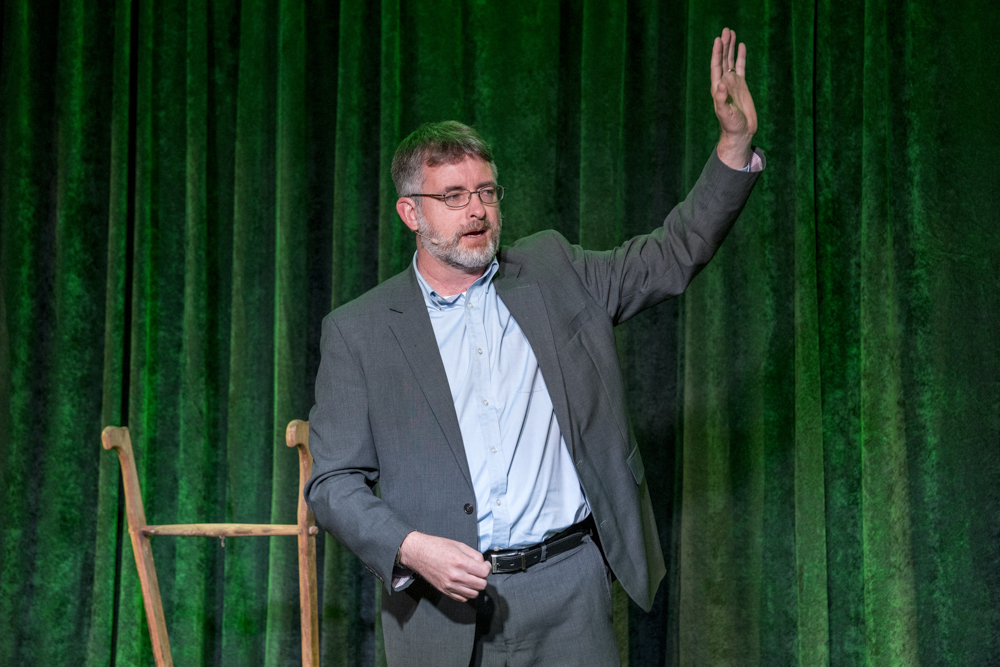
When re-imagining our economic activity through a Christian perspective, it can be easy to get stuck in simply observing and analyzing things from the outside—stroking our chins at the theological or moral implications of various jobs, enterprises, or economic decisions.
These are important considerations, but we should be attentive to also inhabit our work with such a perspective—participating with the divine as an act of fellowship and love. We were not just created to know and understand our work’s purpose, but to actively relate and co-create with the Father, the Son, and the Holy Spirit.
In a recent lecture for the Oikonomia Network, theologian Fred Sanders explores our work from this same sort of Trinitarian perspective, explaining how God’s methods for inviting us into active relationship with the Trinity ought to thoroughly transform our economic imaginations.
Sanders begins by explaining how the starting point is simply recognizing our “sent-ness.” For example, in John 20:21, Jesus says, “As the Father has sent me, even so I am sending you…Receive the Holy Spirit,” demonstrating the pattern for Gospel transformation. The same can be seen in the Great Commission, where we are sent into all the nations.
“The doctrine of the Trinity is about sending,” Sanders explains. “So when I say there is something Trinitarian about all your work, I’m talking about the way God is present to us in our work. I’m trying to point to a mode of our participating in the work of the Triune God… The most important thing a Christian can remember in the workplace is our sent-ness.”
But again, this is not about a detached theological perspective that we impose on our work from the outside. Jesus wasn’t standing on the sidelines as sent his disciples; he was sent himself. In such a way, being sent is an invitation to participate in the patterns and rhythms of the Gospel in daily economic life—to take and share kingdom culture with others, even as we fully engage with it ourselves.
As Sanders explains, the reality of the Trinity equips us with a “portable” mode of fellowship and action, allowing us to “work within God’s work”:
When we think about sending, and when we think about the Trinity, it’s not that the Trinity is over here sending us out. It’s that the Father has sent the Son, and the Son sends us, so that we as Christians are inside the work of the Trinity….
God already puts the dynamic of the divine life into motion, catches us up in it as Christians, and then instructs us about it. He puts us into a reality and then takes us deeper into it. That is the mode of God’s teaching us about the Trinity.
…We are well equipped with everything we need to know to go into the workplace and do the job well. This sent-ness thing is the portable part of Trinitarian theology. This is the part we can keep in the front of our minds and take with us into all of our work in the world.
It’s a simple tweak to our thinking, but the implications to our action are significant. As Sanders reminds us, we assume entirely different attitudes and levels of ownership and responsibility when we are sent to do a job, compared to when we are arbitrarily stumbling into various tasks or projects.
Throughout our economic activity—whether as workers, creators, or consumers—we are not to drones or cogs, waiting for some kind of “spiritual assignment.” Likewise, our witness through work is not dependent on having a sophisticated theology of work from up on high.
The assignment has already been given. We have already been sent, called to serve our neighbors through work and creative service. And this assignment is not one we execute in isolation. It’s one of partnership and fellowship—of participation in that “divine life” that God has already set into motion and, through the finished work of Jesus, calls us ever deeper. We have been equipped, as Sanders notes, with a “portable Trinity.”
“To recognize the secret behind the sending, to remember our sent-ness in our work, and to rest in the reality of that sent-ness, is to spend every day of our work in the world in fellowship with the Father, the Son, and the Holy Spirit,” he concludes.


